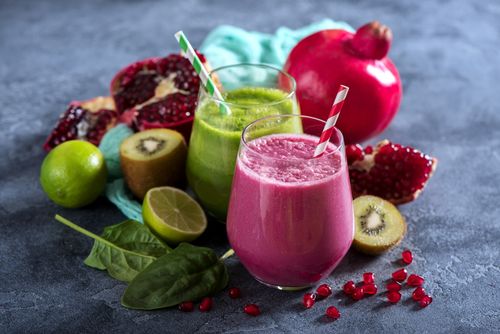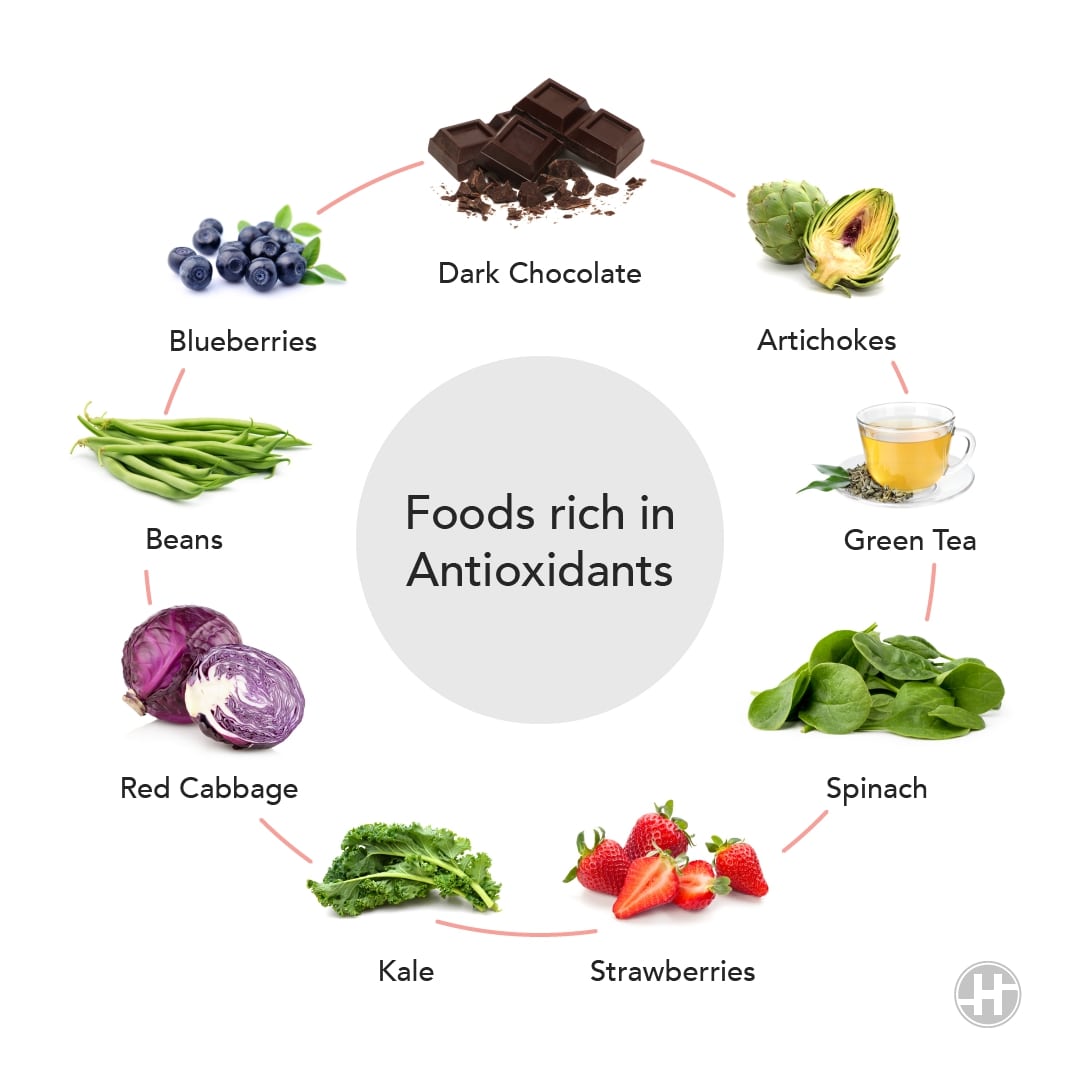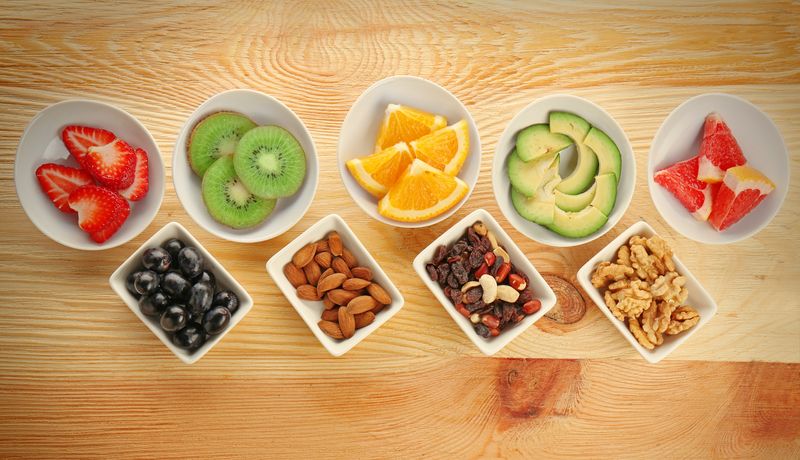Antioxidants are compounds found in several brightly coloured fruits and vegetables. The primary function of antioxidants is to protect our body’s cells from free radical damage. It, in turn, prevents premature ageing and various chronic diseases. However, if the levels of free radicals in your body goes unchecked, these unstable molecules can accumulate.
It can result in a state known as oxidative stress, which can potentially wreak havoc on your DNA and other cell structures. As a result, the risk of chronic diseases such as cancer, Type 2 diabetes, and severe heart disease may increase.
If you want to prevent your body from free radical damage, you should include antioxidant rich foods in your diet. There are many fruits and vegetables rich in antioxidants that this article will expand on.
Interestingly, one of the means to measure the levels of antioxidant content in foods is the FRAP (Ferric Reducing Ability of Plasma) Test. The higher the FRAP value, the better it is.
Types of Antioxidants and How They Work
The most appropriate way to classify antioxidants is to understand whether they are water-soluble, fat-soluble or both fat and water-soluble. Those that are water-soluble work to fight with the free radicals present in the blood plasma. Fat-soluble ones fight the free radicals present in the cell membrane.
Antioxidants are present in certain vitamins and minerals so consuming these on a regular basis can prove to be highly fruitful. Vitamins A, E, K, and C, copper, zinc, iodine, and manganese are rich sources of antioxidants. Certain proteins like glutathione and alpha lipoic acid also contain them.
Phytochemicals like quercetin, lycopene, carotenoids, zeaxanthin, ellagic acid, flavonoids, and lutein also have good amounts of antioxidants in them. Additionally, some hormones, like melatonin, also exhibit antioxidant-like properties.
All these work either by stopping the oxidative process before it starts (preventive action) while others are neutralizing the effect of the free radicals (chain breaking action). Those antioxidants that work in either of these two processes are known as Direct Antioxidants since they engage indirectly working on free radicals.

Classification of Antioxidants
Antioxidants are the first line of defence against the detrimental effects of free radical damage. Therefore, it is essential to maintain optimal health via different mechanisms of action.
Antioxidants fall into three major categories based on their mechanism.
- Primary or chain-breaking antioxidants react directly with free radicals by transforming them into more stable, non-radical products. We can also call them direct antioxidants. They work on the free radicals by neutralising the effect of free radicals.
- The secondary or preventive antioxidants work indirectly on limiting lipid oxidation. Since they work indirectly, we can also term them as indirect antioxidants. It is because these antioxidants stop the oxidative process before it starts.
- At the same time, multifunctional antioxidants are antioxidants that can exhibit both primary and secondary antioxidant properties.
Health Benefits of Antioxidant
1. Helps Reduce Health Risks
It is essential to understand the health benefits of an antioxidant-rich diet. Maintaining a high level of antioxidants in your blood helps reduce the risk of oxidative damage. As a result, one can prevent the risk of chronic diseases related to cancer, heart, and diabetes.
Note that taking antioxidants reduces the risk. It lowers the chance of being affected by one of the few diseases. However, it doesn’t improve the condition of already diagnosed people.
2. Helps Improve Brain Function
Antioxidants help boost your brain function, keep your eyes, skin, and hair healthy. In addition, they also aid better lung functioning. The best way to incorporate antioxidants in your diet is to consume seasonal foods.
As per a study, the antioxidant system helps rescue neuronal cells from oxidative stress. It helps preserve the right redox balance in the brain tissue. In addition, it promotes antioxidative defences for neutralising ROS and blocking transcription. Therefore, adding antioxidant-rich foods to your diet may help improve your brain function.
3. Anti-Ageing Effect
Our skin goes through a lot daily because of pollution and the harshness of UV. As a result, our skin starts showing signs of oxidative stress. Antioxidants combat the damage by reducing these molecules.
UV and pollutants reduce our natural collagen and elasticity and damage our skin tissues. Antioxidants fight the damaging effects of UV and pollutants. As a result, they help prevent skin ageing. Studies prove the hypothesis that oxidative stress plays a significant role in the ageing process.
Antioxidants are substances that combine to neutralise reactive oxygen species. As a result, it prevents oxidative damage to cells and tissues. This process helps to diminish fine lines and wrinkles. In addition, it restores our natural youthful face.
4. Helps Hair Growth
Antioxidants are the secret saviour of your hair. They help in improving collagen and the connecting tissues of our follicles. In addition, they also stimulate our scalp cells to promote healthy hair growth. Antioxidants also help in the premature greying of hair.
5. Reduces Hyperpigmentation
Hormonal changes, sun damage, acne and irregular melanin production may result in hyperpigmentation. However, you can regulate it through antioxidants. Vitamin C is a powerful antioxidant that improves skin and pigmentation. In addition, it contains an enzyme called Tyrosinase, which helps in regulating melanin production.
6. Reduces Risk of Coronary Diseases
Free Radicals cause an increased risk of coronary diseases. That is because they encourage low-density lipoprotein (LDL) cholesterol to stick to heart walls. In addition, antioxidants reduce and remove free radicals. Therefore, antioxidants help improve heart health.
Studies suggest that the consumption of antioxidant vitamins may reduce the risks of cardiovascular disease.
Antioxidants Foods and Their Benefits
There are several foods rich in antioxidants. You should include these in your daily diets to obtain the goodness of antioxidants.

1. Green Tea
Green tea contains 30% polyphenols, which includes large amounts of a catechin called EGCG. These natural antioxidants prevent cell damage, amongst other benefits.
In addition, they have a protective effect against oxidative damage that contributes to the development of cancer. Green tea, being an excellent source of powerful antioxidants, can help reduce the risk of cancer.
The healthful properties of green tea are primarily due to polyphenols. As per a study, antioxidants such as polyphenols in green tea can neutralise free radicals.
As a result, it may reduce or even help prevent some of the damages they cause. These are chemicals with potent antioxidant properties. The effects of polyphenols appear to be greater than those of vitamin C. Polyphenols present in teas are classified as catechins.
However, you should limit consuming Green Tea to a maximum of 3 cups per day.
2. Blueberries
According to several studies, blueberries contain the highest amounts of antioxidants amongst all common fruits and vegetables. They have up to 9.2 mmol (millimoles) per 100 grams.
There are several health benefits of consuming blueberries. They include preventing brain damage in old age, reducing blood pressure, lowering low-density lipoprotein cholesterol levels and decreasing the risk of certain heart diseases. All this is possible due to a type of antioxidant called anthocyanin that is present in blueberries.
Studies say Blueberries are rich in antioxidants and Phyto-flavinoids. They are also high in potassium and vitamin C. In addition, they are anti-inflammatory and lower the risk of heart disease and cancer.
3. Strawberries
Strawberries consist of high amounts of Vitamin C and antioxidants. Like blueberries, they too contain reasonable levels of the antioxidant anthocyanin. You will rarely find it in other food items. The brighter red a strawberry is, the higher would be the anthocyanin levels.
A FRAP analysis suggests that strawberries have 5.4 mmol antioxidants per 100 grams of it. So, do include this fruit in your diet. It reduces LDL cholesterol levels and the risk of severe heart problems.
4. Beans
Often doctors recommend intake of beans to patients owing to their high nutritional value. They are incredibly high in fibre. In addition, amongst vegetables, they are the best source of antioxidants.
An antioxidant called kaempferol is present in considerable amounts in beans which aids in the prevention of cancer and chronic inflammation. Various studies suggest that kaempferol suppresses the growth of kidneys, bladder and lung cancer. A bonus of eating beans is that it helps to regulate bowel movements as well.
5. Dark Chocolate
Dark chocolate contains 15 mmol of antioxidants in every 100 g. It is amongst the highest amounts of antioxidants present in various fruits and vegetables.
Eating dark chocolate also reduces inflammation, regulates blood pressure and lowers the risk of numerous heart diseases. That is due to more cocoa present in it. Additionally, its consumption also raises HDL cholesterol levels. It also prevents the oxidation of LDL cholesterol.
So, eat a little dark chocolate every day. It will certainly satisfy your taste buds and offer many health benefits too!

6. Spinach
While spinach may not be a universal favourite, its health benefits can change your mind. Spinach has reasonable amounts of antioxidants, minerals, and vitamins. In addition, it is low in calories.
Those with poor eyesight should consume this vegetable daily. That is because the antioxidants lutein and zeaxanthin protect one’s eyes from UV light and other damaging light wavelengths.
7. Pecans
Commonly found in South America and Mexico, pecans are a great source of minerals, antioxidants, and healthy fats. These nuts have 10.6 mmol of antioxidants per 100 grams of serving.
Eating pecans increase antioxidant levels in the blood, thereby decreasing oxidised LDL. As a result, intake of pecans can prevent many heart diseases. However, since they are high in calories, one should eat them in moderation.
8. Artichokes
Artichokes are an excellent source of dietary fibre, antioxidants, and minerals. People used artichokes to treat jaundice and some liver conditions in ancient times. In addition, artichoke contains a unique antioxidant, chlorogenic acid.
Chlorogenic effectively hampers the growth of cancer, heart problems, and Type 2 diabetes. Although, one should pay attention to the way they cook or prepare artichokes. Ideally, it would help if you boiled or steamed it. The former raises antioxidant content by fifteen times and the latter by eight times.
9. Kale
Kale is rich in Vitamins A, C, and K and provides antioxidant content up to 2.7 mmol per 100 grams. If possible, include the red varieties of kale in your diet as the antioxidant content is higher (4.1 mmol) in them.
Along with maintaining proper cellular functions, kale is an excellent plant-based source of calcium as well. Thus, higher kale intake fosters good bone health.
10. Red Cabbage
Purple cabbage is also known as red cabbage. It contains vitamins A, C, K and has exceptionally high antioxidants.
The presence of anthocyanin in red cabbage reduces inflammation and the risk of various heart diseases and cancer. In addition, vitamin C serves as one of the significant antioxidants for the body.
Thus, eating red cabbage also strengthens the immune system and paves the way for healthy, glowing skin. Interestingly, steaming this vegetable can decrease its antioxidant level by 35%, whereas stir-frying boosts these levels.

11. Raspberries
An often-used fruit in desserts, Raspberries are soft and tart. They are a great source of Vitamin C, manganese, and antioxidants.
A study suggests that raspberries’ antioxidants and other components may kill 90% of stomach, colon and breast cancer cells. In addition, the antioxidants in raspberries reduce inflammation and oxidative stress.
12. Goji Berries
Goji Berries are the dried forms of two related plants, Lycium barbarum and Lycium chinense. These berries have been part of the traditional Chinese diet for more than 2000 years. In addition, they are rich in minerals and antioxidants.
Goji berries contain unique antioxidants known as Lycium barbarum polysaccharides. These have been linked to reducing the risk of heart disease and cancer and may help combat skin ageing.
13. Beets
Beets are also known as Beetroots. They are scientifically known as Beta vulgaris. In addition, they are particularly rich in a group of antioxidants called betalains. These also give beets their reddish colour.
Additionally, beets contain other compounds that may help suppress inflammation. For example, a study found that taking betalain capsules made from beetroot extract significantly relieved osteoarthritis pain and inflammation.
14. Purple Grapes
Grapes, particularly dark-coloured varieties, are high in phytochemicals, antioxidants that may help prevent cancer and heart disease. Anthocyanin and proanthocyanidin are two of those phytochemicals. They are great for the immune system. In addition, purple grapes are also rich in vitamin C and selenium.
You should consume antioxidant-rich foods to avoid relying on antioxidant dietary supplements. Remember to include colourful fruits and vegetables rich in antioxidants in your diet. The inclusion of these in your diet can fulfil the requirement of antioxidants in the body.
Antioxidant Supplements and Precautions
Apart from natural dietary means, antioxidant supplements are also available. However, the consumption of these supplements is not as successful for humans as they were in trials for animals.
The results of death and disease prevention have been quite disappointing in humans. Furthermore, some of these supplements are detrimental to one’s health. For example, large doses of Vitamin A can lead to defects in women at the time of childbirth.
They are also known to increase the risk of cancer and cardiovascular diseases. In addition, consuming excess Vitamin E may lead to a potential increase in the overall death rate. Ideally, one must consult a physician before taking any supplements.
Summary
Antioxidants are chemicals that protect against free radicals, which are unstable molecules that can cause damage to your cells. The body’s antioxidant defences keep free radicals in check. Therefore, you must maintain the balance between free radicals and antioxidants in your body.
At the same time, an imbalance may lead to oxidative stress. Long-term oxidative stress can harm your DNA and other vital substances in your body. It can even result in cell death.
Antioxidants are also present in animal and plant foods, particularly vegetables, fruits, and berries. They are vital for your body. Sources of antioxidants include kale, coffee, berries, dark chocolate and beets.
Adequate antioxidant intake is critical for a balanced diet. However, research indicates that supplementing high doses may be hazardous. The most effective way is to obtain your daily dose of antioxidants from nutritious plant foods such as fruits and vegetables.
Frequently Asked Questions (FAQ)
Q.Which foods have the most antioxidants?
A: Berries, Artichoke, Kale, Pecans and Raspberries are some of the foods that are rich in antioxidants. Each contains a different group of antioxidants that have specific health benefits.
Q.What drinks are high in antioxidants?
A: Green Tea, Matcha, and Coffee are all rich in antioxidants.
Q. What are natural antioxidants?
A: Natural antioxidants are commonly called Phenolics. They occur in fruits, vegetables, nuts, seeds, leaves, roots, and barks.
Q. Do carrots have antioxidants?
A: Carrots are vegetables that are known to be rich in Vitamin A and Minerals. But, they are also a great source of antioxidants.
Q. Do almonds have antioxidants?
A: Almonds are known to be rich in Vitamin E. However, they are also rich in antioxidants. Therefore, they protect our bodies from oxidative damage.
Q. Is Lemon an antioxidant?
A: Lemons are rich in Vitamin C. They are also rich in antioxidants that remove free radicals. It prevents cell damage.
Q. What juice is highest in antioxidants?
A: Pomegranate Juice is the best source of antioxidants. Its power is said to be greater than red wine and green tea.
Q. Which vitamin is a natural antioxidant?
A: Vitamin C and Vitamin E are natural antioxidants.
Q. Can antioxidants reverse ageing?
A: Models of Animals have demonstrated that dietary supplements with antioxidants vitamins can prevent or reduce age-related changes.
Q. Is coffee an antioxidant?
A: Coffee is a product rich in antioxidants. It includes polyphenols and hydroxycinnamic acids.
Q. How many antioxidants do we need daily?
A: Measuring unit for antioxidants is ORAC (Oxygen Radical Absorbance Capacity). Researchers suggest a daily intake of 3000-5000 ORAC Units.
Q. How can I increase my antioxidant intake?
A: Drinking enough water and eating Iron-rich foods will increase your daily antioxidant intake. You could also use supplements, but you should use them in moderation.
Q. Is green tea an antioxidant?
A: Yes. Green tea contains a catechin called epigallocatechin-3-gallate (EGCG). Catechins are natural antioxidants that prevent cell damage.
Q. Are Bananas high in antioxidants?
A: Bananas are rich in antioxidants. They contain flavonoids and amines.



